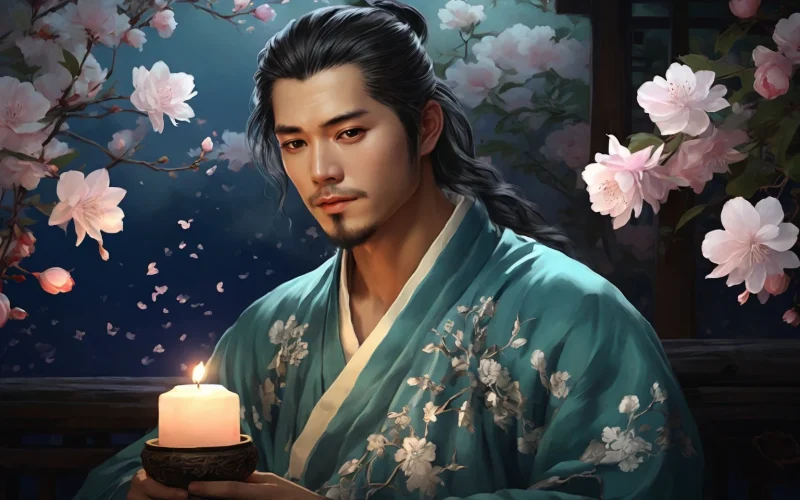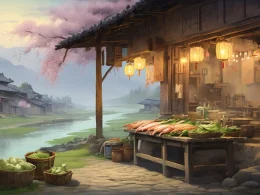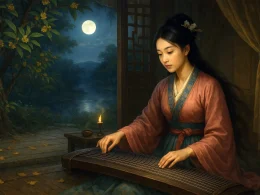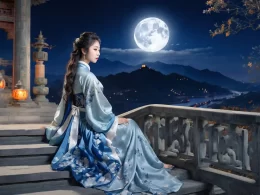Rows of willows cast straight shade,
Their jade strands gleam through misty veil.
Along Sui Dyke, how many times have they waved,
Brushing water, shedding down, seeing travelers sail?
I climb to gaze toward my old land—
Who knows this weary capital soul?
Year after year, down the long road,
We’ve broken enough twigs to span a thousand poles.
Idly, I trace the paths we took,
Where wine flowed with mournful strings, lamps lit our parting nook.
Pear blossoms, elm-fire—Cold Food Feast draws near.
Grief flies swifter than wind-borne arrows,
Warm waves lift the boat—five stations disappear.
That figure stands beyond the sky, lost in sorrow.
Desolate! Regret piles deep.
The winding riverbank lies silent in twilight’s keep.
The setting sun lingers—spring stretches endless, vast.
I remember moonlit towers where we held hands,
Dew-laden bridges where flute songs were cast.
Lost in thought, the past feels like dreams—
Silent tears fall at last.
Original Poem
「兰陵王 · 柳」
柳阴直,烟里丝丝弄碧。
隋堤上、曾见几番,拂水飘绵送行色。
登临望故国,谁识京华倦客?
长亭路,年去岁来,应折柔条过千尺。闲寻旧踪迹,又酒趁哀弦,灯照离席。
梨花榆火催寒食。
愁一箭风快,半篙波暖,回头迢递便数驿,望人在天北。凄恻,恨堆积!
周邦彦
渐别浦萦回,津堠岑寂,斜阳冉冉春无极。
念月榭携手,露桥闻笛。
沉思前事,似梦里,泪暗滴。
Interpretation
Composed during the late Northern Song Dynasty as Zhou Bangyan departed the capital for provincial assignment, this ci poem takes Sui Dyke—a famed southern landmark of Bianjing (Kaifeng) known for willow-breaking farewell rituals—as its emotional locus. Willows, perennial symbols of separation in classical poetry, here become vessels for Zhou's sorrowful reflections on exile. Layering grief through incremental imagery, the poem exemplifies his restrained, deeply suggestive wanyue (婉约) style at its most poignant.
First Stanza: "柳阴直,烟里丝丝弄碧。隋堤上、曾见几番,拂水飘绵送行色。登临望故国,谁识京华倦客?长亭路,年去岁来,应折柔条过千尺。"
Liǔ yīn zhí, yān lǐ sī sī nòng bì. Suí dī shàng, céng jiàn jǐ fān, fú shuǐ piāo mián sòng xíng sè. Dēng lín wàng gù guó, shuí shí jīng huá juàn kè? Cháng tíng lù, nián qù suì lái, yīng zhé róu tiáo guò qiān chǐ.
Willow shadows stretch straight,
their mist-veiled strands teasing emerald hues.
On Sui Dyke—how often have I watched
their drooping threads brush water, flinging catkins at parting figures?
Climbing high to gaze toward home,
who knows this capital-weary wanderer?
Along the road of endless pavilions,
year after year,
we've broken enough pliant twigs to span a thousand feet.
The opening stanza intertwines botany and emotion through willows' physicality. "Shadows stretch straight" (柳阴直) paints noon's vertical light, while "teasing emerald" (弄碧) animates the foliage as a coquette. The poet's recollection of past farewells ("how often have I watched") transforms willows into chronometers of collective sorrow, their measured "brushing" and "flinging" (拂水飘绵) choreographing human departures. The self-identification as "capital-weary wanderer" (京华倦客) reveals existential fatigue beyond immediate journey, while the hyperbolic "thousand feet" (千尺) of broken twigs quantifies history's accumulated grief.
Second Stanza: "闲寻旧踪迹,又酒趁哀弦,灯照离席。梨花榆火催寒食。愁一箭风快,半篙波暖,回头迢递便数驿,望人在天北。"
Xián xún jiù zōng jì, yòu jiǔ chèn āi xián, dēng zhào lí xí. Lí huā yú huǒ cuī hán shí. Chóu yī jiàn fēng kuài, bàn gāo bō nuǎn, huí tóu tiáo dì biàn shù yì, wàng rén zài tiān běi.
Idly retracing old steps,
again wine flows with mournful strings,
lamps illuminating farewell mats.
Pear blossoms, elm-fire hasten Cold Food Festival.
Grief—as swift as wind-driven arrows,
as warm as waves lapping half-poles.
Turning, I find post stations already multiply,
the watched one now at heaven's northern edge.
Here memory and present merge through ritual reenactment. The "mournful strings" (哀弦) and "farewell mats" (离席) resurrect countless historical partings, while seasonal markers ("Pear blossoms," "Cold Food Festival") ground the scene in cyclical time. The couplet "swift as wind-driven arrows / warm as waves" juxtaposes velocity and sensation—departure's abruptness against lingering physical warmth. The spatial dislocation ("heaven's northern edge") transforms human figures into celestial bodies, their separation cosmic rather than terrestrial.
Third Stanza: "凄恻,恨堆积!渐别浦萦回,津堠岑寂,斜阳冉冉春无极。念月榭携手,露桥闻笛。沉思前事,似梦里,泪暗滴。"
Qī cè, hèn duī jī! Jiàn bié pǔ yíng huí, jīn hòu cén jì, xié yáng rǎn rǎn chūn wú jí. Niàn yuè xiè xié shǒu, lù qiáo wén dí. Chén sī qián shì, shì mèng lǐ, lèi àn dī.
Desolation—grief piled high!
Gradually the farewell bend winds away,
the ferry marker stands silent,
the lingering sunset stretches spring beyond limits.
I remember moonlit pavilions where we clasped hands,
dew-laden bridges where we heard flutes.
Pondering past affairs—
as if in a dream,
tears fall unseen.
The finale crescendos through accumulating sorrow. "Grief piled high" (恨堆积) visualizes emotion as geological strata, while "spring beyond limits" (春无极) paradoxically suggests both eternity and unbearable prolongation. The flashback to "moonlit pavilions" (月榭) and "dew-laden bridges" (露桥) crystallizes lost intimacy in sensory fragments—touch ("clasped hands"), sound ("heard flutes")—now rendered hallucinatory ("as if in a dream"). The closing "tears fall unseen" (泪暗滴) performs emotional restraint where silence speaks loudest.
Holistic Appreciation
This ci masterfully interweaves temporal layers—botanical cycles, seasonal festivals, personal history—into a meditation on separation's universality. Zhou's innovation lies in making the willow both subject and medium: its catkins become farewell tokens, its broken branches a collective scar of human transience. The poem's structure mirrors its theme: just as the willow "brushes water" to connect elements, the verses link memory and presence through shared imagery (lamps, music, blossoms).
The emotional arc progresses from observation ("willow shadows") to participation ("we've broken twigs"), then to metaphysical displacement ("heaven's northern edge"), culminating in silent weeping. This movement from external scenery to internal devastation exemplifies classical Chinese poetry's "scene-emotion fusion" (情景交融), where landscape becomes psychological mirror.
Artistic Merits
- Botanical historiography
Willows serve as living archives of farewells, their "thousand feet" of broken twigs materializing centuries of parting rituals. - Kinetic imagery
Verbs like "teasing" (弄), "brushing" (拂), and "flinging" (飘) animate nature as choreographer of human sorrow. - Sensory layering
Cold Food Festival's elm-fire (visual), mournful strings (auditory), and wave warmth (tactile) create immersive melancholy. - Temporal telescoping
Personal memory ("moonlit pavilions") merges with cosmic time ("spring beyond limits"), collapsing temporal scales.
Insights
Zhou's poem reveals how rituals (willow-breaking, farewell banquets) both alleviate and institutionalize grief. The "thousand feet" of broken twigs suggests that collective coping mechanisms may quantify sorrow without assuaging it.
For contemporary readers, the work offers a meditation on emotional archaeology—how places (Sui Dyke) become palimpsests of layered farewells, and how nature (willows) bears witness to human fragility. The final "unseen tears" remind us that profound sorrow often eludes spectacle, residing instead in silent, interstitial moments—much like catkins drifting unseen between earth and water.
Ultimately, the poem measures not just physical distance ("heaven's northern edge") but the greater chasm between memory's vividness and present desolation. In this space, Zhou suggests, poetry becomes the true ferry—not across rivers, but across time.
About the Poet
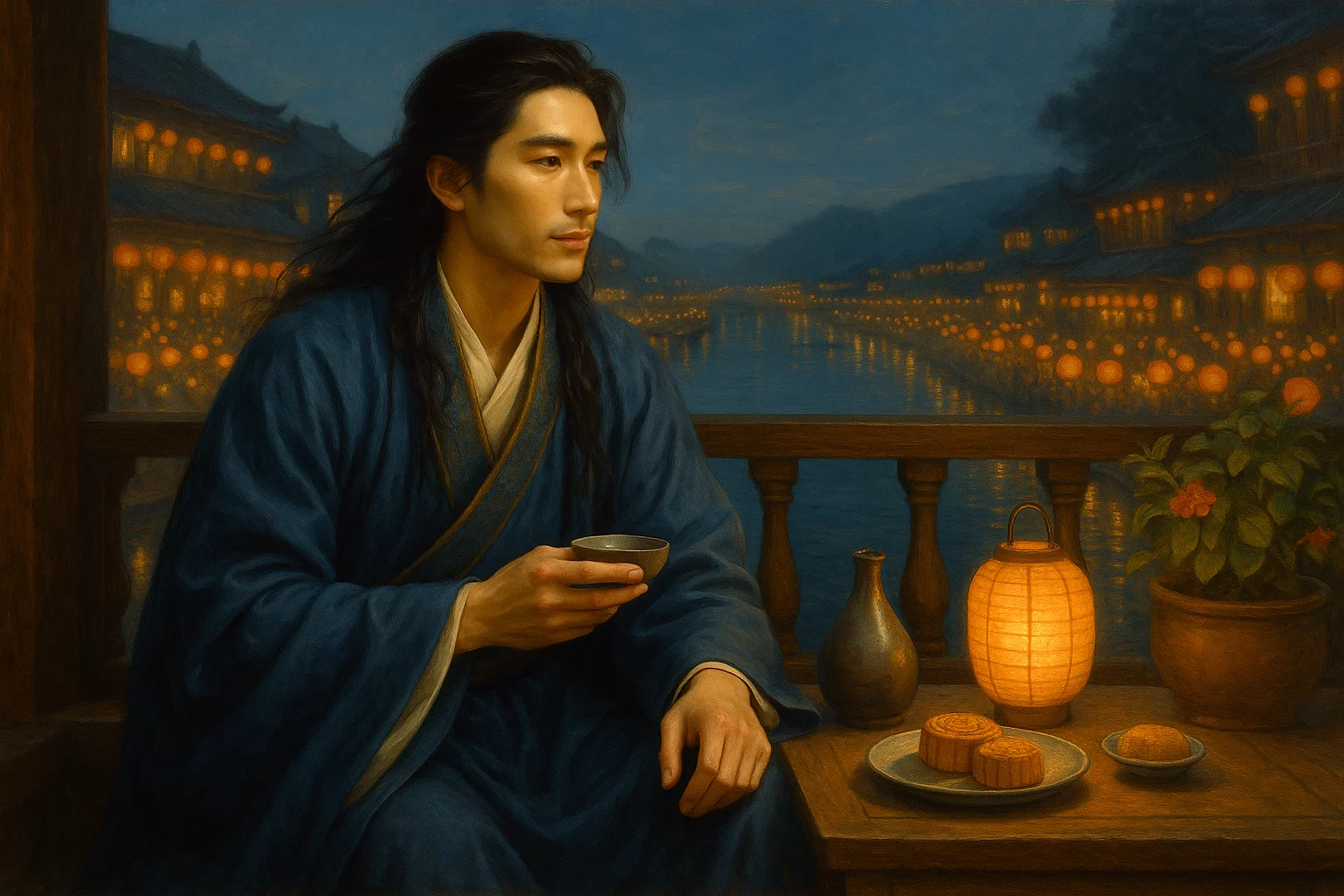
Zhou Bangyan (周邦彦 1056 - 1121), a native of Qiantang (modern Hangzhou, Zhejiang), was the culminating master of the wanyue (graceful and restrained) ci poetry of the Northern Song Dynasty. A virtuoso in musical temperament, his ci are renowned for their opulent refinement and technical perfection. He created dozens of new melodic patterns (cipai) and adhered to strict tonal rules, earning him the title "Crown of Ci Poets." His influence extended to Southern Song masters like Jiang Kui and Wu Wenying, establishing him as the founding patriarch of the Rhymed Ci School.







